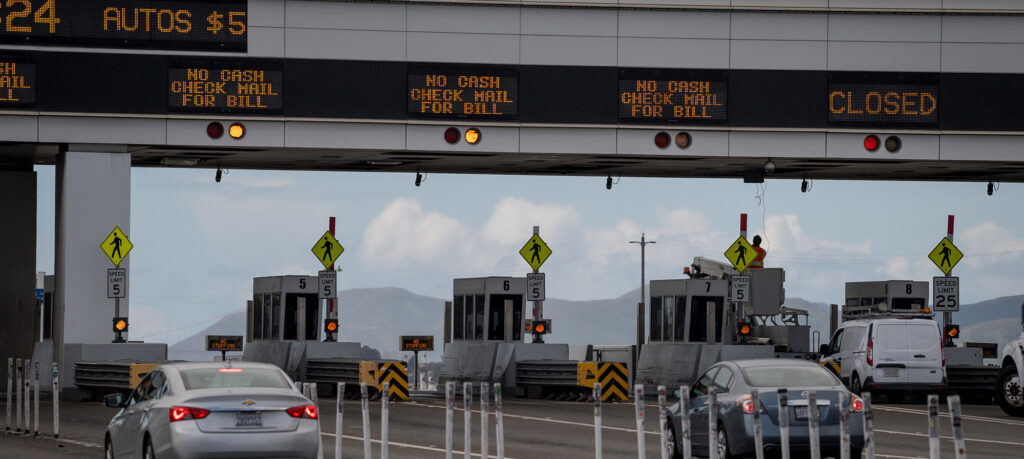Monthly invoices to supplement FasTrak®, replace individual notices
SAN FRANCISCO – The Bay Area Toll Authority (BATA) announced Monday that the start of 2021 will also herald the launch of a new all-electronic toll collection system at the Antioch, Benicia-Martinez, Carquinez, Dumbarton, Richmond-San Rafael, San Francisco-Oakland Bay and San Mateo-Hayward bridges. While bridge customers who pay their tolls with a FasTrak® toll tag or a License Plate Account will see no difference in their statements, patrons who are not enrolled in one of these programs will receive a monthly invoice for all toll bridge crossings made after midnight on New Year’s Eve. Following the suspension of cash toll collection in March of this year, these customers have received individual toll notices for each crossing.
The all-electronic toll collection system being introduced at the Bay Area’s seven state-owned toll bridges is similar to the system used at the Golden Gate Bridge, which adopted all-electronic tolling in 2013. Automated, high-speed cameras will capture images of customers’ license plates, and the FasTrak customer service center will process the images and then mail an invoice each month to the address at which the vehicle is registered with the DMV.
FasTrak customers account for nearly three-quarters of all crossings at the Bay Area’s state-owned toll bridges. BATA encourages customers who do not already have FasTrak to open accounts online at www.bayareafastrak.org or by phone at 1-877-229-8655 (BAY-TOLL). Customers also may obtain FasTrak tags at select Costco and Walgreens stores. A map of retail locations at which FasTrak toll tags are available may be found at https://www.bayareafastrak.org/en/howitworks/retailmap.html. FasTrak tags purchased at Costco or Walgreens must be registered online. A $20 deposit per tag will apply if the account is not funded with a credit card. Drivers who would rather replenish their FasTrak accounts with cash can do so at more than 100 Cash Payment Network locations. A map of these locations may be found at https://www.bayareafastrak.org/en/tolls/cashLocationsMap.html.
Drivers also may open a License Plate Account, which links a license plate to a credit card and charges that card whenever the vehicle crosses a toll bridge; or make a one-time payment, which allows the customer to pay a toll online up to 30 days in advance of a bridge crossing or within 48 hours afterwards. There are no fees for either of these services. More information about License Plate Accounts and one-time payments is available at www.bayareafastrak.org.
The debut of all-electronic tolling and monthly invoicing at the seven state-owned toll bridges also will mark the return of toll payment rules that were temporarily suspended when the COVID-19 pandemic prompted BATA and Caltrans to eliminate cash toll collection on March 21.
Customers who do not have FasTrak or a License Plate Account – and who do not use the online one-time payment option – will be required to return invoices with payment within 30 days. Customers who neglect to return payment within 30 days will receive a “Notice of Toll Evasion” with a $25 penalty for each toll crossing. Customers who do not return invoices with payment after 60 days will receive a “Second Notice of Delinquent Toll Evasion” with a violation penalty of $70 per crossing. Customers who do not return payment after a second notice may have a hold put on their vehicle registration by the DMV and/or have the amount owed referred to a collection agency.
BATA administers all toll revenues from the region’s seven state-owned toll bridges.


Leave a Reply